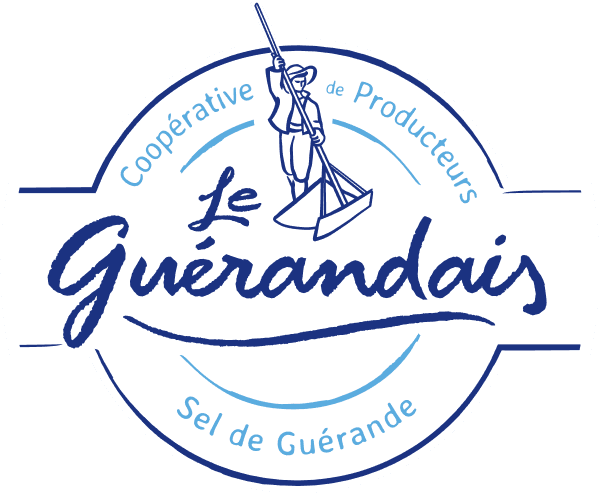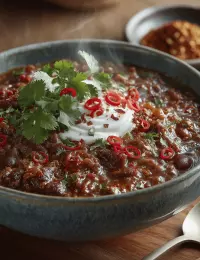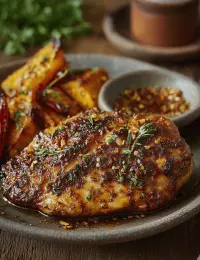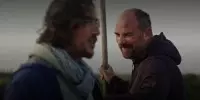

Our values, our commitments
Every day since 1988, the members of the le Guérandais cooperative have been committed to ensuring the longevity of ancestral know-how and a unique heritage through strong values and commitments.
A brand supported by its cooperative
The values of the brand Le Guérandais are supported by the commitments of the entire cooperative.
It is in fact thanks to the strength of the collective, the solidarity and the sense of sharing of over 300 men and women that le Guérandais can guarantee you naturalness, quality and unique know-how.
Engagements
- Solidarité
- Transmission
- Préservation du territoire
- Partage
- Force du collectif
Valeurs
- Innovation
- Qualité
- Naturalité
- Savoir-faire
- Respect de l'environnement
- Transparence
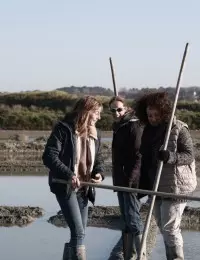
Solidarity
The cooperative encourages social solidarity within the salt marshes and its trades by supporting various social actions.
It forges a partnership with, among others, the ESAT de Leniphen*where it has installed two production lines dedicated to Le Guérandais products.
She also supports Univers-Sel, an association set up by salt growers who are members of the cooperative to provide technical support to salt and rice producers in developing countries. This is a genuine exchange of know-how between producers.
*ESAT de Leniphen: Association jeunesse et avenir committed to getting disabled people back into the job market.
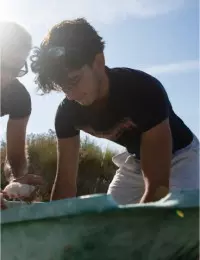
Transmission
Wishing to keep their trade alive, in 1979 the salt workers created a training course in the salt worker profession unique on the Atlantic Arc in partnership with the Chamber of Agriculture: the BP REA, or Brevet Professionnel Responsable d'Entreprise Agricole - Orientation Saliculture.
Eager to pass on their passion and know-how, the cooperative's employees and member salt workers work with interns/trainees throughout the year, as well as with seasonal workers during the high-season harvest.
Open days are also regularly organized to showcase the cooperative's trades and salt worker training to schools and trainees.
Throughout the year, the cooperative's subsidiary, Terre de Sel, offers guided tours of the Guérande salt marshes.
Thanks to these tours led by paludiers and naturalist guides, more than 70,000 people discover each year: how the saltworks work, how salt is produced, the work of the paludier, the quality of le Guérandais salts and the great wealth of the unique territory that is the Guérande salt marshes.
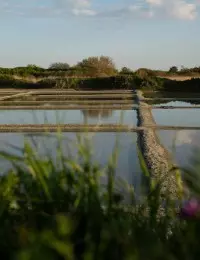
Land preservation
Since the creation of the Le Guérandais cooperative in 1988, salt workers and members have been working every day towards a common goal:sustainably exploiting, highlighting, preserving and perpetuating a unique territory they deeply love, the Guérande salt marshes.
A territory unique in its strength, richness and authenticity within which Man coexists with nature and where salt is born from the unique encounter between water, sun and wind.
In France and internationally, the Guérande salt marshes are recognized and protected: they received the label Paysage in 1992, have been listed on the liste RAMSAR* since 1995 and have been a classified site since 1996. The biodiversity of the salt marshes was designated a Natura 2000** protected site in 1992.
*RAMSAR: a RAMSAR site is designated as a wetland of international importance.
**Natura 2000: Network of sites whose objective is to contribute to preserving the biological diversity of species and habitats on the territory of the European Union within a logic of sustainable development.

Share
Every day, the members of the cooperative live to the rhythm of their passion. The common passion of women and men driven by strong values that they share and have at heart to perpetuate in the exceptional setting that are the Guérande salt marshes.
All year long, everyone is proud to work together to bring to life and share a unique know-how, a territory and exceptional products.
Paludiers and employees work together and get together for convivial moments, internal events, but also collective reflection sessions on various themes such as Corporate Social Responsibility (aiming to combine positive impact on society, respect for the environment and economic viability).
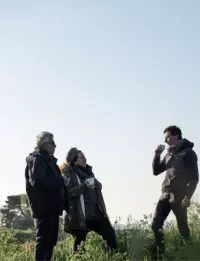
Collective strength
To be in a cooperative, is to believe in the strength of the collective.
It's to be part of an ethical and supportive groupwithin which everyone finds their place and actively participates in the overall success.
Throughout the year, everyone helps each other out and engages in collective work: from upstream to downstream, from workcamps between salt workers to exchange meetings between salt workers and employees...
Everyone works towards a common goal: to preserve, bring to life, publicize and energize ancestral know-how.

Innovation
Innovation Le Guérandais is committed to keeping Guérande salt alive and exploiting all its qualities and benefits.
This is why we are constantly working to enrich its ranges and productsin order to spread the power of Le Guérandais salt around the world.
Every day's work fueled by passion and the desire to continue living an exceptional salt derived from ancestral know-how.
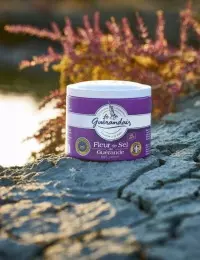
Quality
Le Guérandais salts are quality salts recognized by certifications and labels such as Protected Geographical Indication for the Sel de Guérande and Fleur de sel de Guérande appellation.
The cooperative is a member of the label Nature et Progrès for the constant development of quality salts from agriculture that respects the environment and people.
Flavored salts are certified Agriculture Biologique and ground salts and coarse salts are recognized by the Label Rouge for their superior quality.
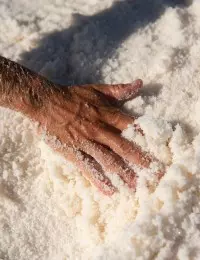
Naturality
Le Guérandais salt is 100% natural, unwashed, unrefined and contains no additives.
It's a natural salt from the Atlantic Ocean and the daily work of the salt workers who, all year round, prepare their salt pans to receive the salt water.
A water that, on warm summer days lulled by a gentle breeze, sees its concentration increase and its salt crystallize in the carnations, to be then harvested by hand by the salt workers.
It's a profession that lives to the rhythm of nature. It's an alchemy that feels like magic, subject only to the desires of water, sun and wind.
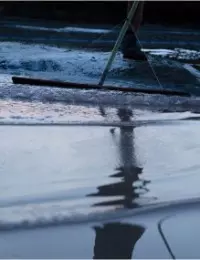
Know-how
Every day, the salt workers work the salt marshes and harvest Le Guérandais salt by hand using traditional tools used for centuries that have remained, for the most part, wooden.
They thus perpetuate an ancestral know-how that respects nature and is faithful to a thousand-year-old heritage: they are the true guardians of a unique heritage.
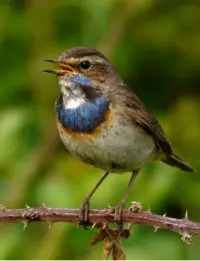
Respect for the environment
Respect for the environment Le Le Guérandais is above all a story of men and women attached to their territory.
Every day, Le Guérandais salts are hand-harvested and produced directlyin the heart of their historic land, the Guérande salt marshes.
From time immemorial, paludiers and adherents have made it a point of honor to respect and preserve their territory from harmful practices by banning the use of weedkillers, maintaining the hydraulic networks in undeveloped areas of the salt marshes, undertaking restoration work for future farms and maintaining the dikes.
This deep respect for their environment is also marked by the cooperative's support and mobilization against degrading developments on the salt marsh site, but also the channeling of tourist flows, so that tourism and salt farming activity can coexist.
It was in this context that, between 2018 and 2023, the Guérande salt marshes came within the scope of the Life Sallina project aimed at restoring and conserving habitats of community interest and salt marsh species in the Pays de la Loire Region.
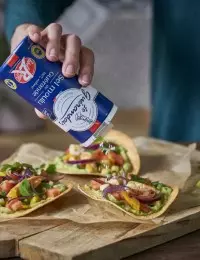
Transparency
We've always been committed to producing quality salts that are 100% natural, unrefined and respectful of nature and people.
It's important for us to work to help as many people as possible discover ourmethods and know-how in harvesting salts.
This is how, every year, more than 70,000 people set off to discover the Guérande salt marshes with Terre de Sel and there discover the secrets of le Guérandais salt, from its origins to the ancestral methods of production and harvesting.
Guerande salts are quality salts recognized by certifications and labels such as IGP for the appellation Sel de Guérande and Fleur de Sel de Guérande.
We have built our cooperative on the conviction that the future of Le Guérandais Guérande Salt is inseparable from the quality of the product, the skills of the people and the richness of the heritage. This is how, over the years, Le Guérandais has obtained certifications and labels such as the Label Rouge, the Nature et Progrès mention and the Agriculture Biologique certification.
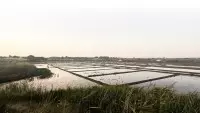
All the news of the Le Guérandais cooperative
To find out more about the extraordinary heritage of the salt marshes, its events and the strength of the Le Guérandais cooperative, read our articles!
